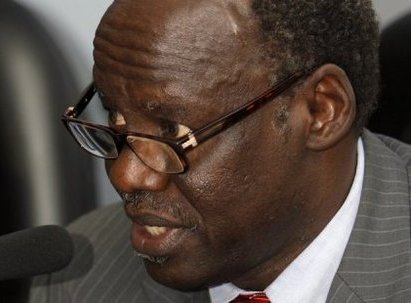S. Sudan political parties disown leader at peace talks
August 22, 2014 (JUBA) – South Sudanese political parties participating in ongoing peace talks mediated by the East African regional bloc IGA have announced that Lam Akol is no longer their leader.

Martin Tako, the chairperson of United Democratic Salvation Front currently leads the group, whose membership comprises of Bishop Gabriel Roric Jur, member of National Congress Party in South Sudan, Wilson Lodiong Sebit, vice president for African National Congress and th National Democratic Front chairman, James Aniceto Batikaya.
“We have come to discover that our leader has decided to operate alone. He does things which are outside our mandate. We came here to help the two main warring parties to agree on the way forward, not for us to be working against one party in the conflict in support of the other,” Bishop Roric told the SSTV on Thursday.
“He [Akol] is no longer our leader. We have decided to replace him already. A new name of our leader will be sent to the mediation team,” he added.
Akol, for instance, reportedly held meetings with rebel leader, Riek Machar and members of South Sudan former political detainees, which his team described as not being within agreed mandate.
Those loyal to the embattled leader, however, said only Akol was mandated to speak on behalf of the political parties, as per recommendations made during their 15 August, 2014 meeting. At the meeting, the parties reportedly came up with strategies to ensure the warring parties allow the IGAD multi-stakeholder format talks.
Last week, the pro-Akol faction accused South Sudan government delegation at the talks of allegedly creating division within the parties.
“This is definitely the work of the government delegation, especially [Michael] Makuei and Joseph Ukel. They have never been happy with us from the moment we have a position paper on peace talks,” they earlier claimed.
“They just want us to be following government without opinion”.
Analysts and observers, however, say they saw no reason why difference should emerge within the political parties at a time when South Sudanese are seeking solutions to the country’s conflict.
“I think they just acted out of fear of being branded by the government when they return as having betrayed the gentlemen agreement which led to their selection from their parties,” said Daniel Majok, an activist from South Sudan’s Warrap state.
“You know these are not purely independent political parties. Some of them are already in the government and so they fear they would be removed from their positions if they do not support the government position at the talks, which is understandable,” he added.
Moses Duku, a native of Central Equatoria state, said the split was expected because the political parties’ membership comprised of a “bunch of desperate power-hungry” officials who can hardly win parliamentary seats.
“I am not a fan of Lam Akol, but it is good to call a spade a spade. There is nothing wrong with his approach. It is universally acceptable means of activating stalling talks like those taking place in Addis Ababa, Ethiopia,” said Duku.
“When there is slow progress in negotiations, informal discussions can be used to build consensus because parties will be involved in direct contact,” he added.
(ST)
